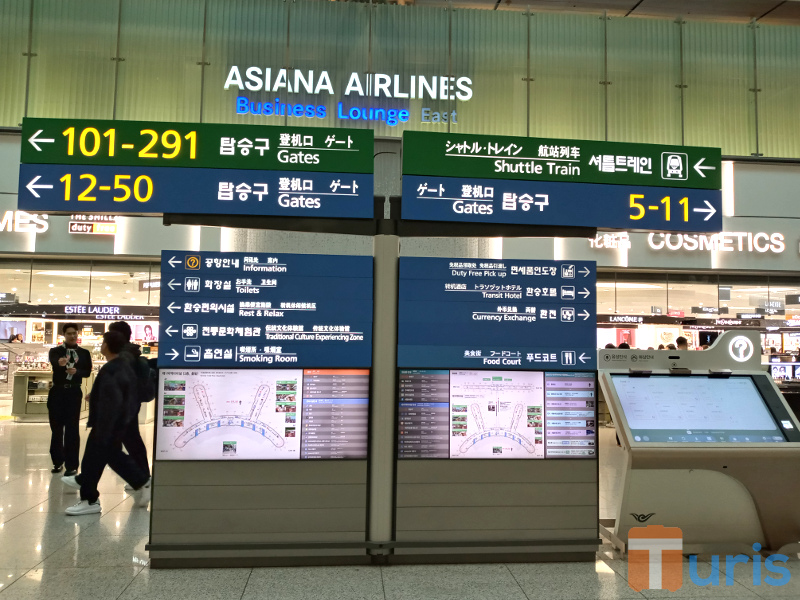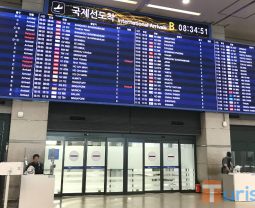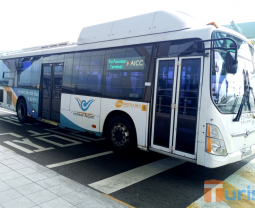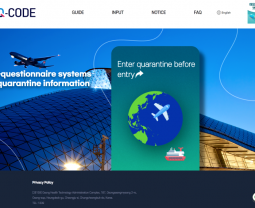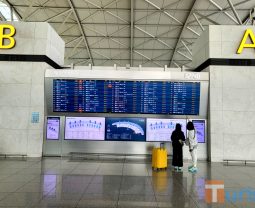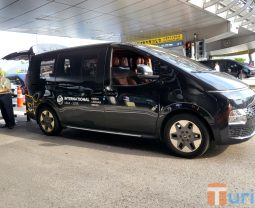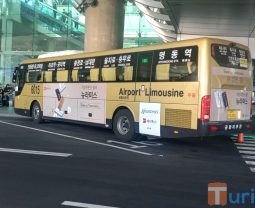Last updated: December 16th, 2025
“Is it easy to navigate when departing from Incheon Airport?” This is not an uncommon question that may arise when a traveler is about to fly back home from Incheon Airport after visiting Korea for the first time. On Incheon airport website, you can actually find one dedicated section that explains the steps in the departure procedures. That page alone is a very good baseline for you to prepare for your next journey from Incheon Airport. However, you may still be looking for some finer details and more visuals that can help you better project your experience at the airport.
If it’s your first time to read the articles about Incheon airport provided here, we have compiled several articles about the airport: check-in counters at Terminal 1, check-in counters at Terminal 2, transfer options from Terminal 1 to Terminal 2, and using the shuttle bus to transfer between terminals. This list is growing as we gradually convert the drafts in the backlog into published articles.
In this article, we’ll explain about the departure gates at Incheon Airport Terminal 1, showing you the expected experience you’d have from arriving at the airport to getting to your departure gates.
While you may land on this article to look for the gate map, you’ll get more than that. Besides the gate map, we also supplement this article with highly relevant photos as well as some pro tips, which we present to help you become more familiar with the departure hall and the overall departure process at Incheon Airport Terminal 1.
Incheon Airport in Brief
Incheon Airport was first opened on March 29th, 2001 to supersede Gimpo Airport as the primary gateway to South Korea. There were only 1 passenger terminal and two runways on the inauguration date of the airport. The third runway and midfield concourse were built during the second phase of Incheon Airport construction project from January 2002 to June 2008. Subsequently, Terminal 2 was built during the third phase of the airport construction project started in mid 2013. After around five years of construction work, Terminal 2 commenced its operations on January 18th, 2018. Expansion of Terminal 2 and construction for the fourth runway, which was the fourth phase of Incheon airport construction project, took place from November 2018 to November 2024.
As of August 2025, Incheon Airport operates 2 passenger terminals (Terminal 1 and Terminal 2), one midfield concourse, which can be historically considered part of Terminal 1, and 4 runways. The layout of the terminals and runways at Incheon Airport are shown in the map below.
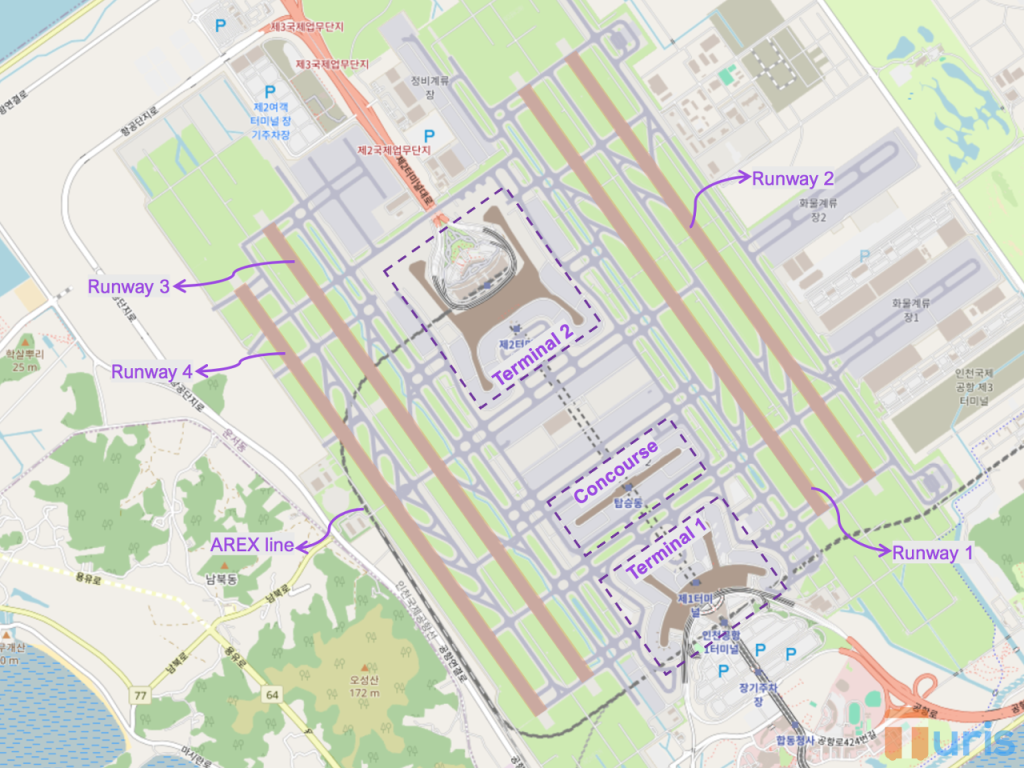
Terminal 1 and Terminal 2 have been fully operational, allowing the airport to handle over 1,000 flights daily across its four runways. This translates to passenger traffic of more than 100 million passengers annually.
Departure vs Transfer at Incheon Airport Terminal 1
There is one big difference between departing and transferring at Incheon Airport Terminal 1; it’s the time to reach the departure gate. It is obvious that regular departure from Incheon Airport Terminal 1 is a more involved process compared to the same-terminal transfer for layover passengers. That being said, you may be wondering about the overall time needed from arriving at Incheon Airport Terminal 1 to reaching your departure gate.
Incheon Airport is a modern airport that deploys advanced technologies to streamline passenger flows. As a departing passenger, you may expect that the technologies and systems applied to the departure procedures are efficient such that you can have good time estimate when going through the whole departure procedures. Even though the passenger departure and transfer at Incheon Airport are usually seamless, there can be some gotchas to anticipate, which we will explain in the following section.
Departure Procedures at Incheon Airport Terminal 1
After arriving at Terminal 1 building and entering the departure entrance hall on the third floor through one of the 14 entrance gates, you will walk to the designated check-in counter for your flights to check in. To save up time waiting in the check-in queue, do online check-in so that you can readily use the self check-in kiosk to print your boarding pass and baggage tag as you arrive at the check-in area. If you’re flying business class or a premium alliance member, there is usually a special counter that you can use to expedite the check-in process.
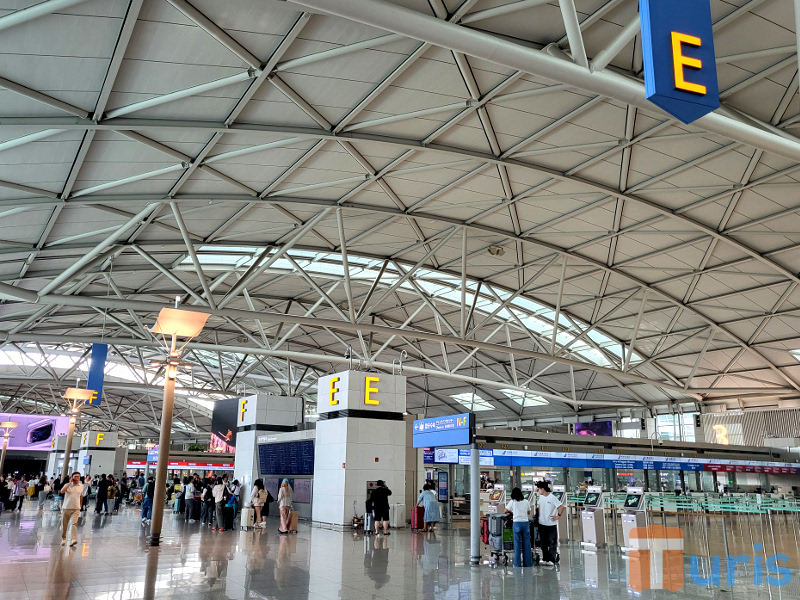
Once the check-in process is done, you can proceed to the security check gate for security screening and X-ray scan. Here is an important thing to note. There can be serious bottleneck at the security check entrance. This issue has also been covered by local news. Note that Terminal 1 has 6 security check gates but only 4 gates are currently used, which are security check gate 2 to gate 5. Long queues for security screening can form at a certain time in the day especially in the morning, certain day of the week, and during holiday season in Korea.
To prevent from getting trapped in the security screening queue, there are few things you can do:
- Arrive early at the airport so that you spare enough time to complete your departure procedures. We recommend having around two hours prior to your flight departure time at the time you join the regular security screening queue after completing the check-in process. Having this much time buffer is crucial especially when the line is long.
- Use Smart Pass for expedited security check. You will use a dedicated line for smart pass users when queueing for the passport check. This can save some time since the regular line for security screening is usually longer.
- Look at the real time waiting time display above the security check entrance, which has been installed and available from early August this year. The display will give you more concrete idea on the expected time needed to reach your boarding gate.
- Choose a less congested security check entrance. There is a passenger traffic monitoring panel installed near to each security check entrance. Identify a less congested gate and proceed with the security screening through that gate.
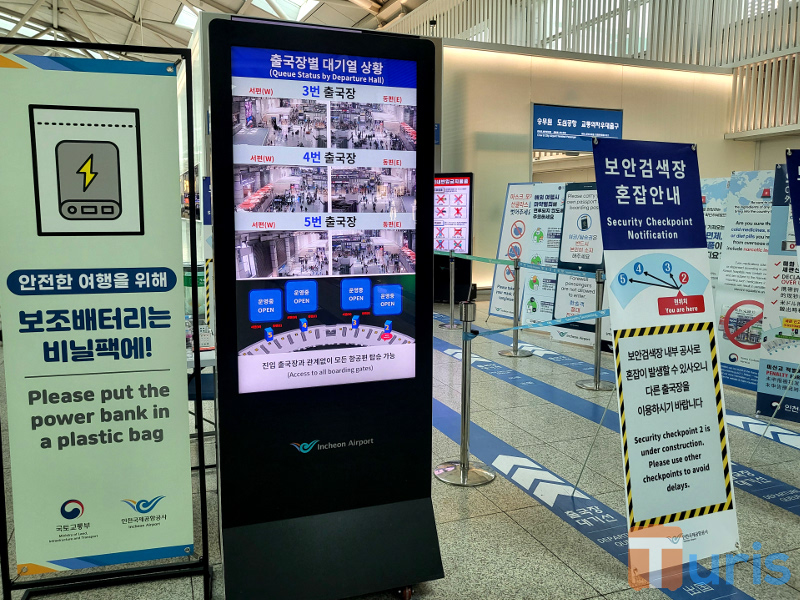
After going through the security screening and clearing the immigration, you will enter the departure hall. There are ample signs in the hallway that show you the direction to your departure gate.
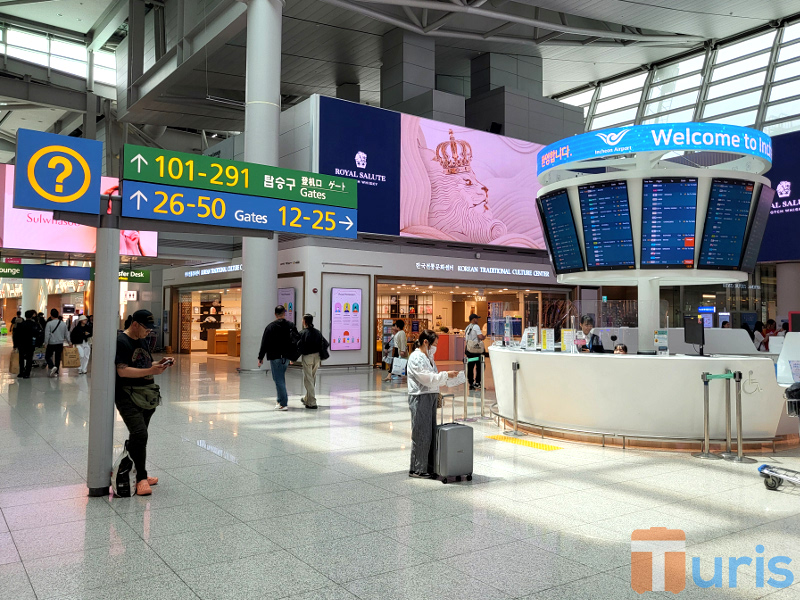
Transfer Procedures at Incheon Airport Terminal 1
When having a layover at Incheon Airport, you have the option to go outside of the airport and enter Korea or stay airside in the restricted area to wait for your connecting flight. If you do the later, you will follow the transfer procedures that excludes immigration clearance.
As you disembark from your plane and start walking in the arrival corridor, look for the “Transfer” sign. Follow the direction and find the entrance to the transfer passageway that leads to the transfer area.
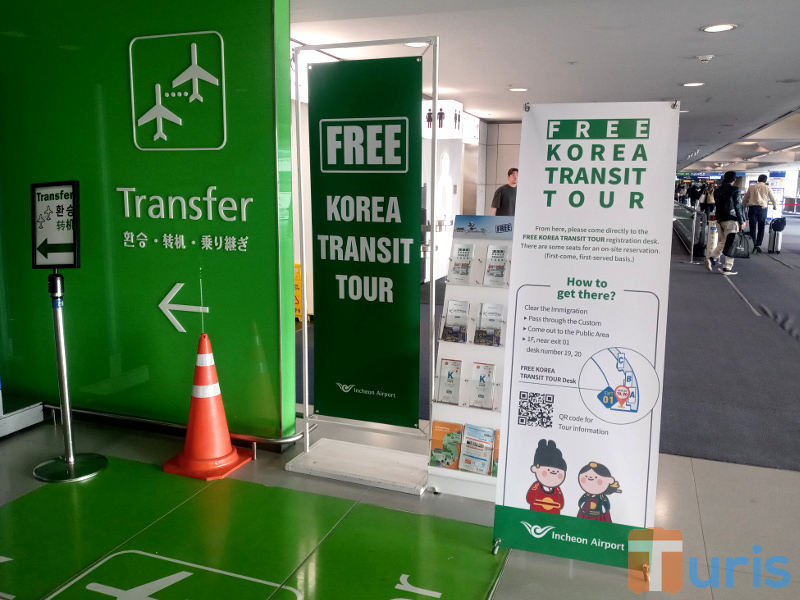
At the transfer area, you will go through security check and X-ray scan. The process is normally a breeze and the queue is usually manageable. After completing security screening, you will exit on the fourth floor of the departure hall. On the fourth floor, you can find transfer desks, lounges, relaxation zones, shower room, food court, and more. Your departure gate is located on the third floor. To reach your departure gate, you can use the elevator or escalator to go down one level. Locate the signs (overhead signs, mounted signs) and follow the direction to your gate.
Note that if you want to go to the food court on the fourth floor, the entrance is on the third floor.
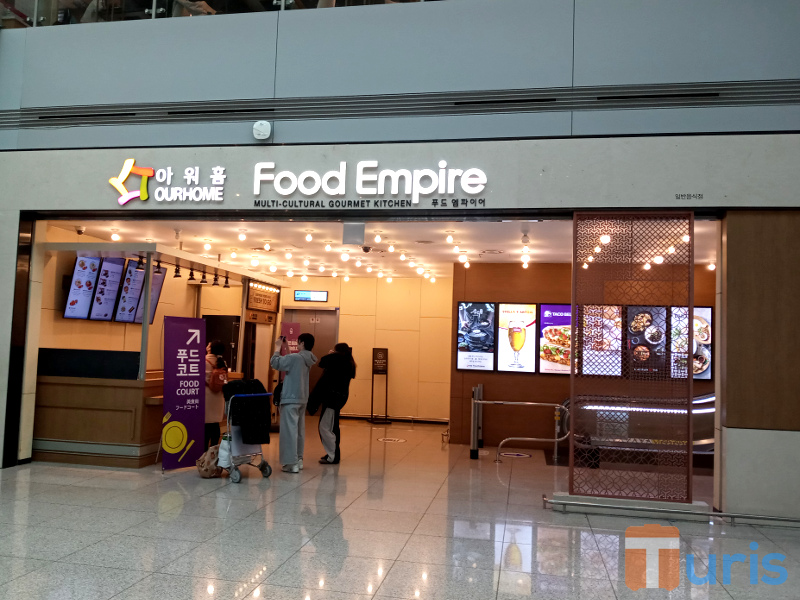
Incheon Airport Terminal 1 Departure Gate Map
In the figure below, you can see the map of departure gates at Incheon Airport Terminal 1. The map also includes the midfield concourse, which is often classified as a separate building named “Concourse“, but can be technically considered part of Terminal 1. This is since passengers whose flights depart from midfield concourse should first do check-in at Terminal 1.
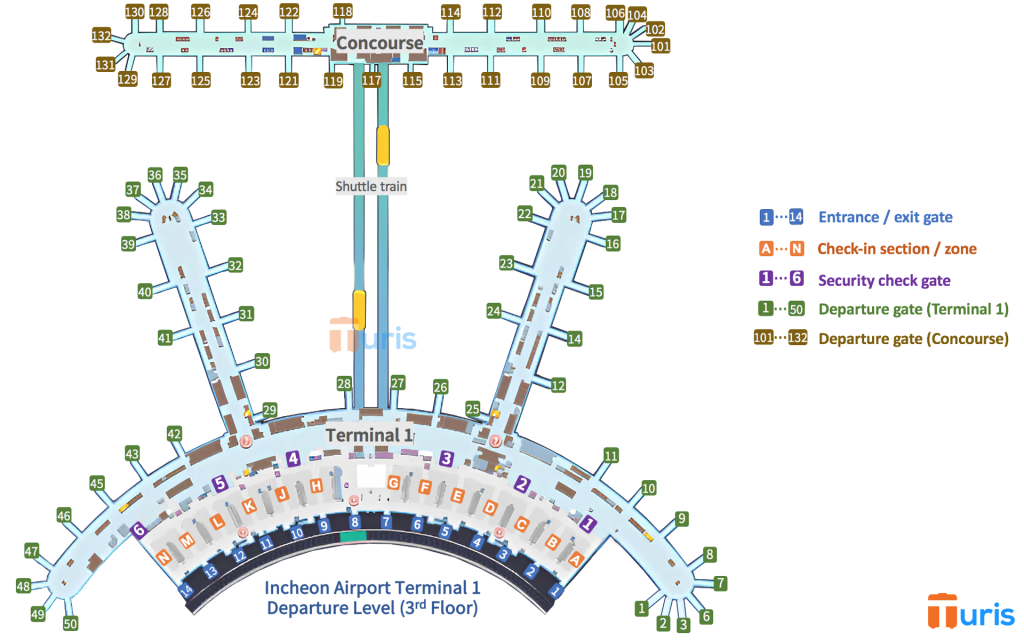
The locations of departure gates at Incheon Airport Terminal 1 shown in the map can be summarized as follows:
- Gate 1 to Gate 50 are located on the third floor of Terminal 1 main building
- Gate 101 to Gate 132 are located on the third floor of (Terminal 1) Concourse
Now, onto the finer details. If you look at the map more carefully, you may spot some quirks on the gate numbering. Here they are.
Gate 4 does not exist. The reason: number 4 is associated with bad luck in Korean culture.
Gate 5 has been decommissioned. The gate was originally a remote gate for domestic flight but retired in 2018 due to domestic flight service closure.
Gate 13 does not exist. A symbol of bad luck in many cultures, this number is also avoided.
Gate 25 was a remote gate without permanent jet bridge connection. This gate is not currently in use.
Gate 29 was a remote gate without permanent jet bridge connection. This gate is not currently in use.
Gate 44 does not exist. This number is avoided since it represents double four that translates to double bad luck.
Gate 51 to Gate 100 do not exist and are skipped in the gate numbering.
Gate 116 has been decommissioned. The gate was a remote gate but later retired.
Gate 120 has been decommissioned. The gate was a remote gate but later retired.
Besides the quirks on gate numbering, here are additional details about departure gates at Incheon Airport Terminal 1 that you might have not known before.
Jet bridge-only departure gates. Nowadays, Incheon Airport Terminal 1 only operates gates with permanent jet bridge connection. There is no gate that is designated as an assembly point to transport international passengers to an aircraft parked in a midfield apron by bus.
Gate number sequence patterns. Gate numbers in the Terminal 1 main building are arranged in counterclockwise order. In contrast, gate number sequence in Concourse follows a zigzag pattern from left to the right.
Swing / hybrid gates. Gate 1, Gate 2, and Gate 3 are swing gates that can be used either for domestic or international flights. Other gates are exclusively used for international flights only. These three gates were reopened in July this year after being vacated for more than seven years.
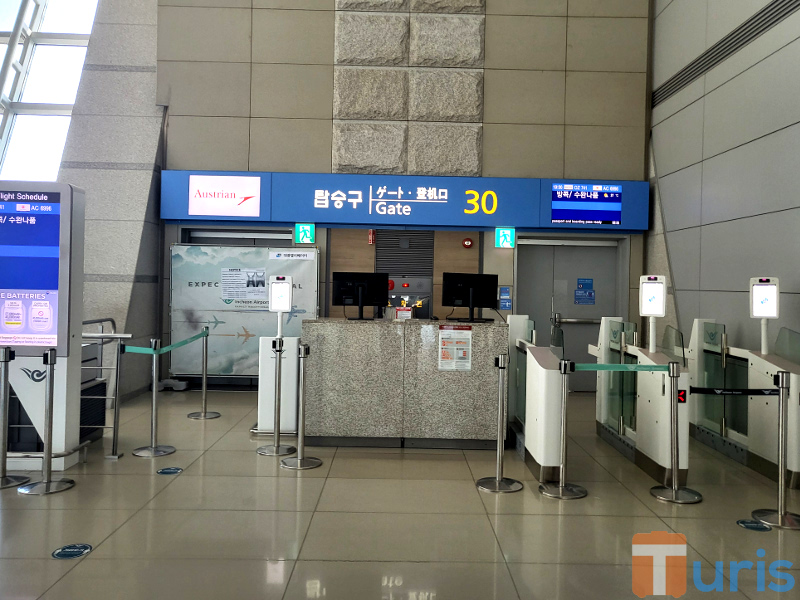
Given that not all gates at Incheon Airport Terminal 1 are actively under use, we provide you with the list of gate numbers for international departure that are currently used at Incheon Airport Terminal 1 in the table below.
| Boarding Gate Number | Floor | Concourse | Nearest Security Check Gate |
|---|---|---|---|
| Gate 1 | 3 | Terminal 1 (east wing) | Gate 2 |
| Gate 2 | 3 | Terminal 1 (east wing) | Gate 2 |
| Gate 3 | 3 | Terminal 1 (east wing) | Gate 2 |
| Gate 6 | 3 | Terminal 1 (east wing) | Gate 2 |
| Gate 7 | 3 | Terminal 1 (east wing) | Gate 2 |
| Gate 8 | 3 | Terminal 1 (east wing) | Gate 2 |
| Gate 9 | 3 | Terminal 1 (east wing) | Gate 2 |
| Gate 10 | 3 | Terminal 1 (east wing) | Gate 2 |
| Gate 11 | 3 | Terminal 1 (east wing) | Gate 2 |
| Gate 12 | 3 | Terminal 1 (central east) | Gate 2, Gate 3 |
| Gate 14 | 3 | Terminal 1 (central east) | Gate 2, Gate 3 |
| Gate 15 | 3 | Terminal 1 (central east) | Gate 2, Gate 3 |
| Gate 16 | 3 | Terminal 1 (central east) | Gate 2, Gate 3 |
| Gate 17 | 3 | Terminal 1 (central east) | Gate 2, Gate 3 |
| Gate 18 | 3 | Terminal 1 (central east) | Gate 2, Gate 3 |
| Gate 19 | 3 | Terminal 1 (central east) | Gate 2, Gate 3 |
| Gate 20 | 3 | Terminal 1 (central east) | Gate 2, Gate 3 |
| Gate 21 | 3 | Terminal 1 (central east) | Gate 2, Gate 3 |
| Gate 22 | 3 | Terminal 1 (central east) | Gate 2, Gate 3 |
| Gate 23 | 3 | Terminal 1 (central east) | Gate 2, Gate 3 |
| Gate 24 | 3 | Terminal 1 (central east) | Gate 2, Gate 3 |
| Gate 25 | 3 | Terminal 1 (central east) | Gate 2, Gate 3 |
| Gate 26 | 3 | Terminal 1 (central) | Gate 3 |
| Gate 27 | 3 | Terminal 1 (central) | Gate 3 |
| Gate 28 | 3 | Terminal 1 (central) | Gate 3, Gate 4 |
| Gate 29 | 3 | Terminal 1 (central west) | Gate 4 |
| Gate 30 | 3 | Terminal 1 (central west) | Gate 4, Gate 5 |
| Gate 31 | 3 | Terminal 1 (central west) | Gate 4, Gate 5 |
| Gate 32 | 3 | Terminal 1 (central west) | Gate 4, Gate 5 |
| Gate 33 | 3 | Terminal 1 (central west) | Gate 4, Gate 5 |
| Gate 34 | 3 | Terminal 1 (central west) | Gate 4, Gate 5 |
| Gate 35 | 3 | Terminal 1 (central west) | Gate 4, Gate 5 |
| Gate 36 | 3 | Terminal 1 (central west) | Gate 4, Gate 5 |
| Gate 37 | 3 | Terminal 1 (central west) | Gate 4, Gate 5 |
| Gate 38 | 3 | Terminal 1 (central west) | Gate 4, Gate 5 |
| Gate 39 | 3 | Terminal 1 (central west) | Gate 4, Gate 5 |
| Gate 40 | 3 | Terminal 1 (central west) | Gate 4, Gate 5 |
| Gate 41 | 3 | Terminal 1 (central west) | Gate 4, Gate 5 |
| Gate 42 | 3 | Terminal 1 (west wing) | Gate 5 |
| Gate 43 | 3 | Terminal 1 (west wing) | Gate 5 |
| Gate 45 | 3 | Terminal 1 (west wing) | Gate 5 |
| Gate 46 | 3 | Terminal 1 (west wing) | Gate 5 |
| Gate 47 | 3 | Terminal 1 (west wing) | Gate 5 |
| Gate 48 | 3 | Terminal 1 (west wing) | Gate 5 |
| Gate 49 | 3 | Terminal 1 (west wing) | Gate 5 |
| Gate 50 | 3 | Terminal 1 (west wing) | Gate 5 |
| Gate 101 | 3 | Concourse (east wing) | Gate 3, Gate 4 |
| Gate 102 | 3 | Concourse (east wing) | Gate 3, Gate 4 |
| Gate 103 | 3 | Concourse (east wing) | Gate 3, Gate 4 |
| Gate 104 | 3 | Concourse (east wing) | Gate 3, Gate 4 |
| Gate 105 | 3 | Concourse (east wing) | Gate 3, Gate 4 |
| Gate 106 | 3 | Concourse (east wing) | Gate 3, Gate 4 |
| Gate 107 | 3 | Concourse (east wing) | Gate 3, Gate 4 |
| Gate 108 | 3 | Concourse (east wing) | Gate 3, Gate 4 |
| Gate 109 | 3 | Concourse (east wing) | Gate 3, Gate 4 |
| Gate 110 | 3 | Concourse (east wing) | Gate 3, Gate 4 |
| Gate 111 | 3 | Concourse (east wing) | Gate 3, Gate 4 |
| Gate 112 | 3 | Concourse (east wing) | Gate 3, Gate 4 |
| Gate 113 | 3 | Concourse (east wing) | Gate 3, Gate 4 |
| Gate 114 | 3 | Concourse (east wing) | Gate 3, Gate 4 |
| Gate 115 | 3 | Concourse (central) | Gate 3, Gate 4 |
| Gate 117 | 3 | Concourse (central) | Gate 3, Gate 4 |
| Gate 118 | 3 | Concourse (central) | Gate 3, Gate 4 |
| Gate 119 | 3 | Concourse (central) | Gate 3, Gate 4 |
| Gate 121 | 3 | Concourse (west wing) | Gate 3, Gate 4 |
| Gate 122 | 3 | Concourse (west wing) | Gate 3, Gate 4 |
| Gate 123 | 3 | Concourse (west wing) | Gate 3, Gate 4 |
| Gate 124 | 3 | Concourse (west wing) | Gate 3, Gate 4 |
| Gate 125 | 3 | Concourse (west wing) | Gate 3, Gate 4 |
| Gate 126 | 3 | Concourse (west wing) | Gate 3, Gate 4 |
| Gate 127 | 3 | Concourse (west wing) | Gate 3, Gate 4 |
| Gate 128 | 3 | Concourse (west wing) | Gate 3, Gate 4 |
| Gate 129 | 3 | Concourse (west wing) | Gate 3, Gate 4 |
| Gate 130 | 3 | Concourse (west wing) | Gate 3, Gate 4 |
| Gate 131 | 3 | Concourse (west wing) | Gate 3, Gate 4 |
| Gate 132 | 3 | Concourse (west wing) | Gate 3, Gate 4 |
Pro Tips for Departure from Terminal 1
Incheon Airport has been consistently ranked as one of the best airports in the world. While the airport authority has been striving to maintain its excellence, there can be some circumstances that prevent you from getting the best experience from the airport. Here, we provide you with some tips to help you navigate the airport like a pro and get most of what the airport offers.
Morning Flights
Passenger traffic for departure is usually high from 6AM to 9AM. If your flight departs from Incheon Airport Terminal 1 within these hours, ensure that you arrive early at the airport. Using Smart Pass is also a good way to shorten the time needed to go through security screening, which is usually the most bottlenecked process in your departure procedures at the airport.
City Airport Check-in at Seoul Station
If your last stay prior to departing from Incheon Airport is in Seoul and you fly with an airline that allows city airport check-in, you may consider using city check-in service at Seoul Station. Before checking in, you need to have bought an AREX express train ticket heading to Incheon Airport. Your baggage will be handled by the airline to be transported to Incheon Airport. It travels in a special car in AREX express train. Your AREX express train schedule should be at least three to three and half hours before your flight departure. The city airport check-in service is available from 05:20 to 19:00.
Passengers flying with any of the airlines in the list below can use the city airport check-in service:
- Air Busan (BX)
- Air Seoul (RS)
- Asiana Airlines (OZ)
- Eastar Jet (ZE)
- Jeju Air (7C)
- Jin Air (LJ)
- Korean Air (KE)
- T’way Air (TW)
Note that an airline with city airport check-in service may disallow city airport check-in for some flight routes. Contact your airline in advance to confirm your eligibility.
After you arrive at Incheon Airport Terminal 1, you can use the fast track lane to enter the security check area.
Using Shuttle Train
If your departure gate number is any of Gate 101 to Gate 132, you will need to take the shuttle train to go the midfield concourse and reach your departure gate. Once you’re in the departure hall after clearing immigration, follow the direction to Gate 101-132. You will walk to the central area of Terminal 1 building. Take the elevator near to Gate 28 to go down from the third floor to the shuttle train platform on B1 floor.
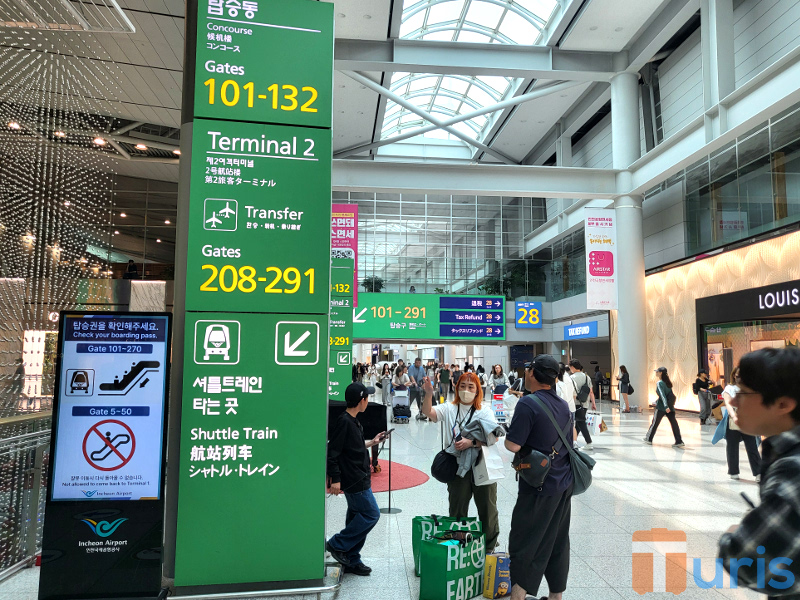
Note that you are not expected to return after boarding the shuttle train. So make sure that your gate number is above 100 before you take the shuttle train.
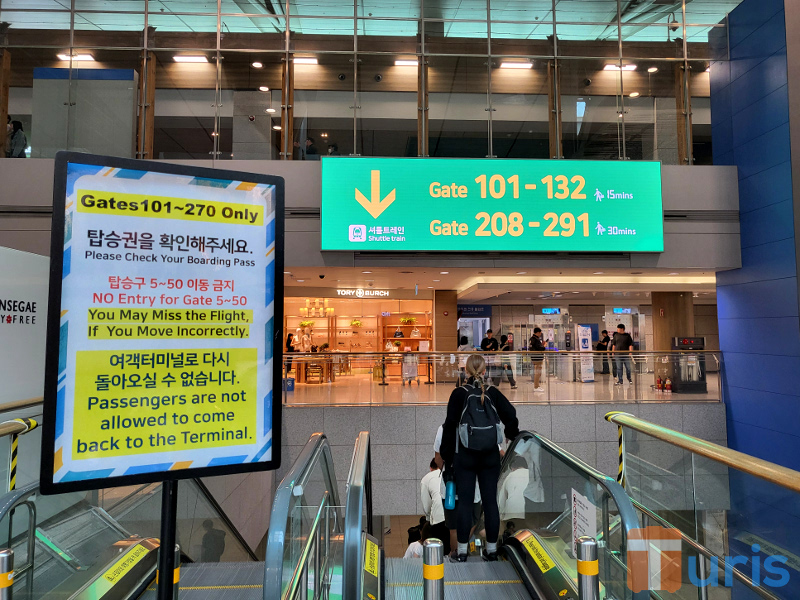
The shuttle train operates 24 hours a day with interval between trains around five minutes. Travel time from Terminal 1 to Concourse using the shuttle train is around 2 minutes.
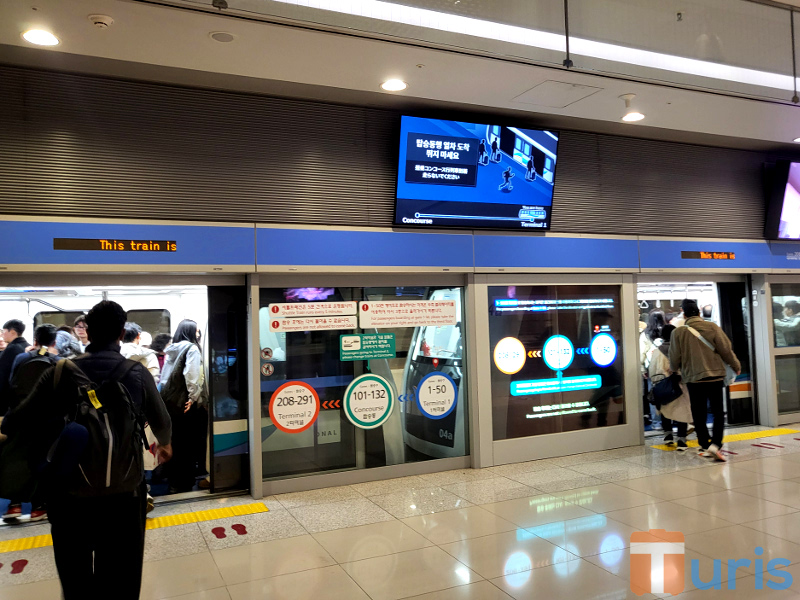
Airlines Departing from Concourse
The midfield concourse is primarily used by low cost carriers. When flying with one of the airlines from the list below, there is big chance that your flight will depart from Concourse instead of the Terminal 1:
- AERO K (RF)
- Air Asia X (D7)
- Cebu Pacific (5J)
- China Eastern Airlines (MU)
- China Southern Airlines (CZ)
- Easter Jet (ZE)
- Hong Kong Express (UO)
- Jeju Air (7C)
- Jetstar (JQ)
- Peach Aviation (MM)
- Philippines Air Asia (Z2)
- Scoot (TR)
- Shanghai Airlines (FM)
- Sky Angkor Airlines (ZA)
- Spring Airlines (9C)
- Thai Air Asia X (XJ)
- Tigerair Taiwan (IT)
- T’way Air (TW)
- Vietjet (VJ)
- Vietnam Airlines (VN)
- Zip Air (ZG)
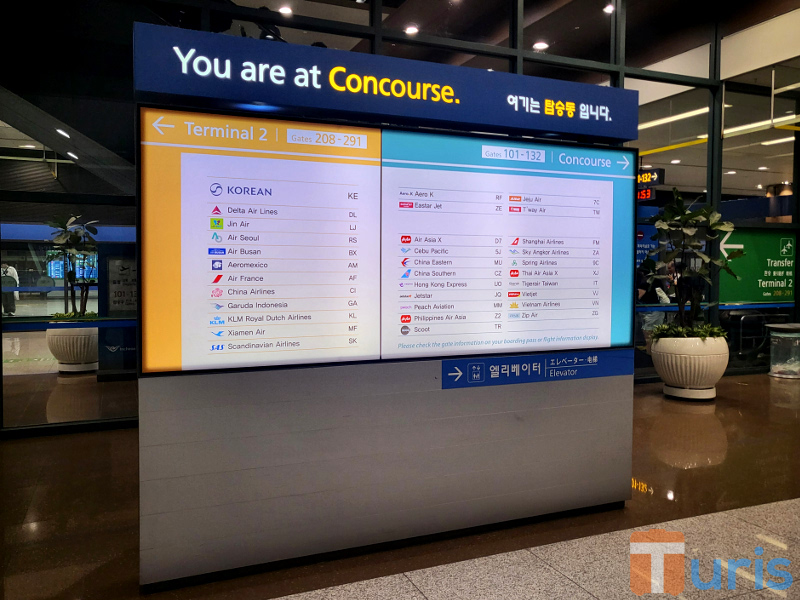
It is uncommon for full service airlines, except China Southern Airlines, China Eastern Airlines, Shanghai Airlines, and Vietnam Airlines due to the lounge location, to depart from Concourse since full service airlines are primary users of Terminal 1.
Hidden Gem Facilities
If you still have plenty of time before your flight departure, you can enjoy the facilities provided by Incheon Airport. If you have a layover and want to freshen up, you can use the shower room on the fourth floor. The shower room can be used for free by transfer passengers.
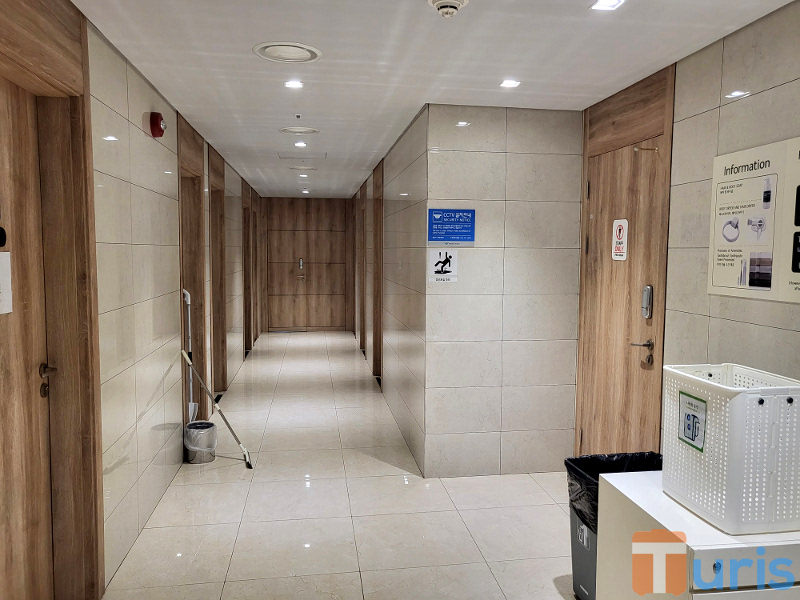
Make sure you also check the nap zone. The dim lighting and the comfy recliners help deliver good nap for you so that you are properly rested for your flight.
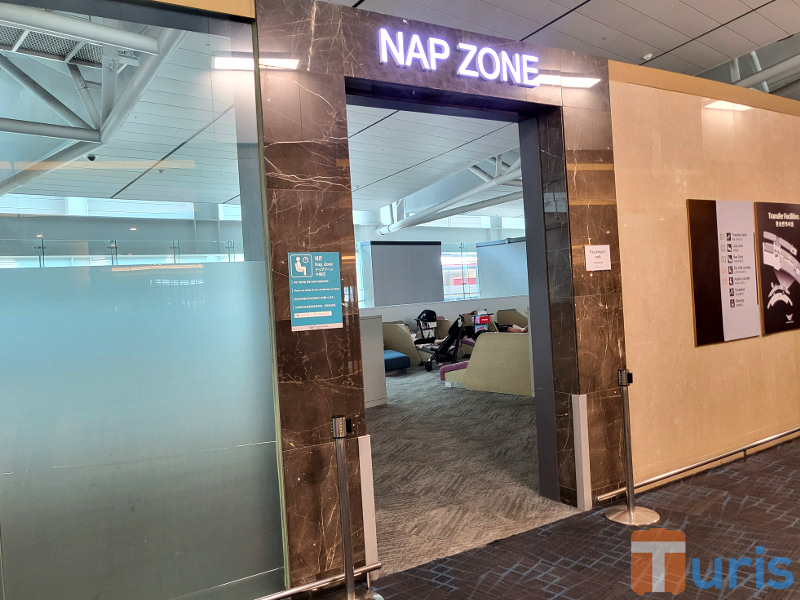
Star Alliance Lounges
Asiana Airlines operates four lounges at Incheon Airport: Business Lounge East, Business Lounge Central, Business Lounge West, and Business Suite Lounge. These lounges are accessible by passengers flying business class with Asiana and also Star Alliance gold members. If you’re eligible for access, these lounges are good when you want to just relax and enjoy the airport vibe. However, food might be just borderline satisfactory. For better palate experience, you might consider hopping to SilverKris lounge located on the fourth floor near to Gate 29. The lounge is smaller in size but offers a wider array of food options.
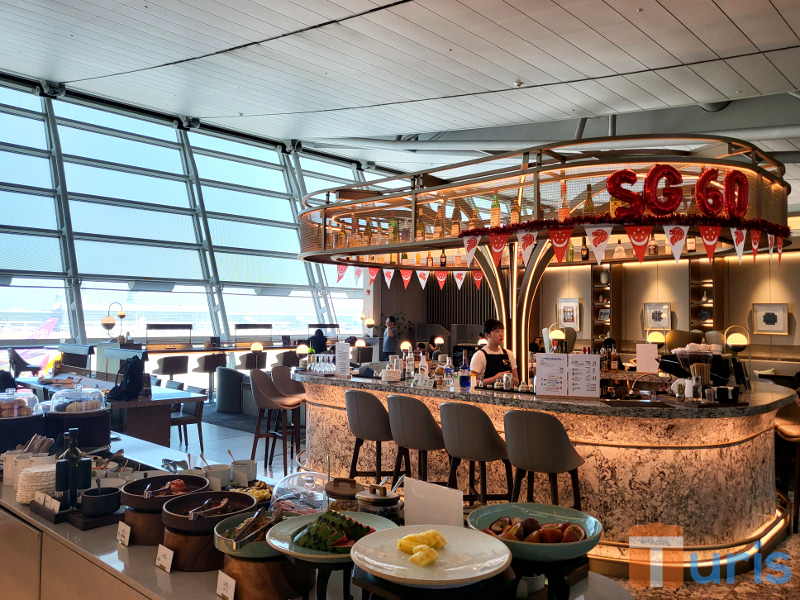
If you have lounge membership or lounge access, or consider using a lounge before boarding your flight, you can also check our guide to all lounges at Incheon Airport Terminal 1.
Frequently Asked Questions
Q: How many gates are there at Incheon Airport Terminal 1?
A: This depends on the inclusion of the midfield concourse section. If we exclude the midfield concourse, there are 44 gates that are currently used at Incheon Airport Terminal 1. In Concourse alone, there are 30 gates that are being used. Hence, if the gates in the midfield concourse are included, there are 74 gates that are currently being used at Incheon Airport Terminal 1. Note that Gate 5, Gate 25, Gate 29, Gate 116 and Gate 120 were assigned in the past as remote gates but are not currently being used.
Q: Where is Gate 28 at Incheon Airport?
A: Gate 28 for departure is located on the third floor at the central area of Incheon Airport Terminal 1. Escalator to shuttle train platform is located near to Gate 28. You can also find tax refund counter and kiosks near to Gate 28.
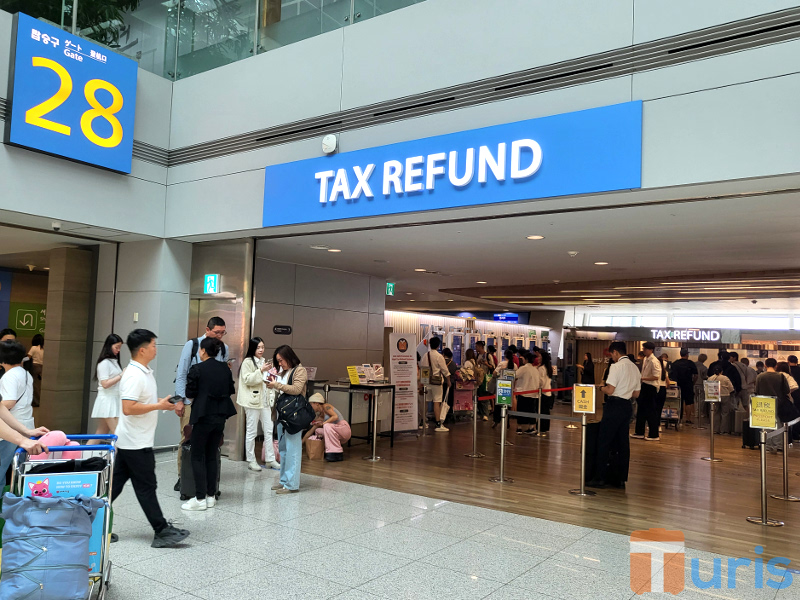
Q: Where is Gate 11 at Incheon Airport?
A: Gate 11 for departure is located on the third floor at the east wing of Incheon Airport Terminal 1. You can find entrance to Asiana Business Lounge East and Asiana Business Suite Lounge near to Gate 11.
Q: Where is Gate 115 at Incheon Airport?
A: Gate 115 for departure is located on the third floor at the Concourse of Incheon Airport Terminal 1. You can find entrance to Sky Hub Lounge Concourse and China Eastern Airlines Lounge near to Gate 115.
